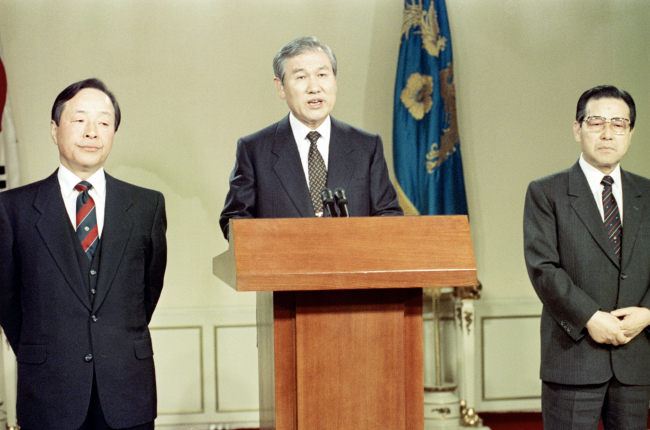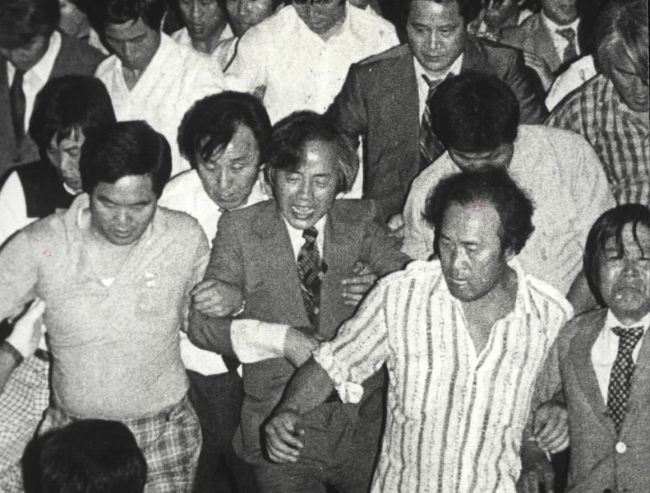Kim remembered as democracy fighter, economic reformer
By Korea HeraldPublished : Nov. 22, 2015 - 19:07
Late former President Kim Young-sam is noted for his decades-long campaign against military rulers and reform that enhanced transparency in financial transactions, while his past collaboration with political foes, corruption involving his son and economic fallout questioned his leadership.

Joining the National Assembly in 1954 at age 26, Kim had led an arduous movement against military-backed leaders including former Presidents Park Chung-hee and Chun Doo-hwan, which led to incarcerations, house arrest and even threats of terror attacks.
With late former President Kim Dae-jung, Kim had maintained a unique relationship ― a mixture of cooperation in their democracy movements and rivalry amid their bids for Cheong Wa Dae. The former died in 2009.
During his democracy movement, he went through a series of tribulations that even threatened his life.

In 1969, when he vehemently objected to the constitutional revision to allow then President Park Chung-hee to serve for three consecutive terms, three assailants threw a bottle of acetic acid toward Kim’s car. Kim walked unscathed.
In the 1970s, his resistance against the military dictatorship peaked. He directly challenged the so-called Yushin Constitution, which the Park government enacted to prolong his term. His resistance resulted in him being ousted from the parliament.

As the new military-backed government was launched following the assassination of former President Park in 1979, an undeterred Kim stepped up his fight against then general-turned leader Chun.
In 1983, he staged a hunger protest for 23 days to mark the third anniversary of the May 18 pro-democracy movement. The protest added to the momentum for a national campaign to challenge the Chun government.
The massive pro-democracy movement in June 1987 weakened the military-backed government and helped achieve a constitutional revision to enable a direct presidential election system.

However, Kim’s failure to unify the opposition candidacy with Kim Dae-jung during the 1987 presidential election led to another term by the general-turned-president, Roh Tae-woo.
“Had the candidacy been unified at the time, there would have been an early end to the military-backed government,” said Lee Jang-hee, politics professor at Hankuk University of Foreign Studies. “The division in the opposition forces also led to a deepening of regionalism.”
In 1990, Kim’s decision to join forces with his political foes ― then-President Roh Tae-woo and leader of another opposition party Kim Jong-pil ― vitiated his past democratic struggle, drawing intense criticism from opposition politicians for caving in for the sake of power.
Critics derided him as a “betrayer,” but the merger among his Reunification Democratic Party, Roh’s ruling Democratic Justice Party and Kim Jong-pil’s New Democratic Republican Party helped him win the 1992 presidential election. The aligned party became the precursor to the incumbent conservative Saenuri Party.
One of the most prominent legacies from his presidency is his purge of politically minded generals who had deeply engaged in the policymaking.
“With his determination, he purged the politicized generals, a task that laid the foundation of the country’s institutional democracy,” said Yoon Pyung-joong, political philosophy professor at Hanshin University.
“With the purge, Korean military leaders have become depoliticized. It was possible because of his determination, without which it must have been difficult given the amount of influence generals had wielded at the time.”
Kim is also known for his sweeping reform in the financial and real-estate transactions. His government introduced the “real-name” financial transaction system, which made it difficult for politicians and businessmen to engage in suspicious transactions under false names.

“The need and urgency for real-name transactions had been mentioned several times before. But his predecessors did not push for it,” professor Yun noted. “The real-name policy, which is now the basic principle for financial dealings, has increased transparency and reduced the risks of corruptive practices.”
The former leader is also remembered for his straightforwardness in his diplomacy toward Japan, exemplified by his now-famous quote, “We will teach them to have manners once and for all,” regarding Japanese politicians defending Japan’s wartime atrocities. He continued to press Japan to atone for colonial-era wrongdoings including Japan’s wartime sexual enslavement of Korean women.
During his term, Japan issued two government statements apologizing for its past misdeeds including the sexual slavery issue.
Such achievements, however, have been eclipsed by corruption scandals involving his son Hyun-chul. The scandals were a disgrace for Kim, who had vowed to deal sternly with any cases involving the presidential family.
Kim Hyun-chul was called a “little president” as he peddled influence in various state affairs including ones involving major conglomerates including Hanbo Group. He was given a two-year jail term for receiving kickbacks from businesspeople and evading taxes in 1997.
Kim is also criticized for his poor handling of the economic crisis, which forced the country to seek an emergency bailout from the International Monetary Fund.
A series of deadly accidents also called into question his competence for crisis management. In 1994, a bridge over the Hangang River collapsed, killing 32 people. A year later, a department store in Seoul collapsed, killing 501 citizens.
By Song Sang-ho (sshluck@heraldcorp.com)
-
Articles by Korea Herald




![[Herald Interview] 'Amid aging population, Korea to invite more young professionals from overseas'](http://res.heraldm.com/phpwas/restmb_idxmake.php?idx=644&simg=/content/image/2024/04/24/20240424050844_0.jpg&u=20240424200058)






![[Hello India] Hyundai Motor vows to boost 'clean mobility' in India](http://res.heraldm.com/phpwas/restmb_idxmake.php?idx=644&simg=/content/image/2024/04/25/20240425050672_0.jpg&u=)








